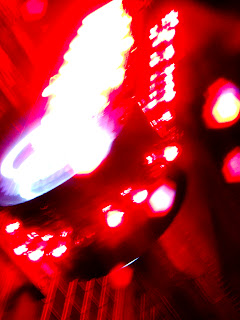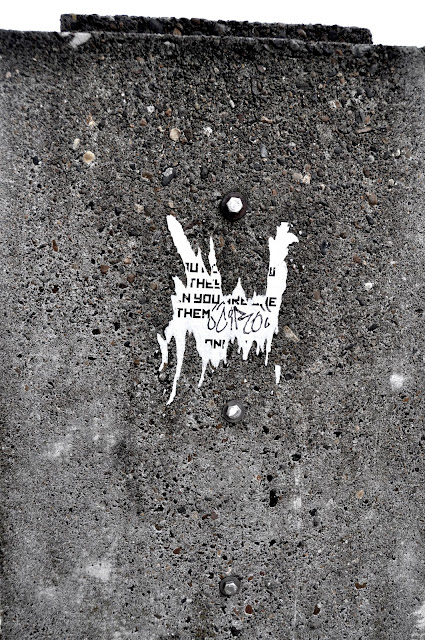http://www.arviesmith.com/collection-pages/chitlin_circuit/dem_golden_slippers.htm
My father had come up to Portland for the first time this week, and he came to finally see my in my new apartment and get a tour of my new "adopted" city. As per usual we talked for hours at home and out on our journey about history, religion, art and culture. Even though our conversations seem to drift, digress, pause and evolve, they somehow always seem to come back to the core concepts that sparked our interests in the beginning. This weekend one of those concepts that kept emerging and tumbling back and forth was identity. We looked at my piece in the "Nothing On The Wall" show and spoke about how individuals from birth are unique, and yet who they are and will be is not singularly contained within themselves, but also projected and outlined within their environment. The environment helps to define and outline individuals just as much as that individual themselves. To be an activist, our environment must first challenge us to have something to act upon, therefore helping us define ourselves in relation to that external event. To be an intellectual, we have to find engagement with the world and share intellect, but only more so comparatively than someone else in the world. To know what night is, we have to be aware of day, and vice versa. There have to be at least two elements for comparison, before we can make distinction and definition between one or the other.
I feel that the push and pull of influences and forces that create definition and outline individuals is extremely powerful when it comes to race and culture. It is common to understand someone of a different culture by first examining our own. Then we compare, weigh, and judge, based upon our own unique understandings. In anthropology, this is called an ethnocentric viewpoint. [explain ethnocentricity] It is an analytical and very human point of view. We learn new languages by connecting the meanings of the strange sounds to the meanings of the familiar sounds we've grasped. In school we learn new concepts by piggy-backing on the foundation of old, familiar concepts (as seen strongest in math in which simple formulas like addition and subtractions are often conceptual building blocks for the more complex formulas of quadratic equations and (TBC).
Wednesday, December 14, 2011
Tuesday, November 15, 2011
Tuesday, November 8, 2011
Cats
Because I could, and everyone deserves a guilty pleasure (or two)...
(Like I said, a guilty pleasure, or two)
Thursday, November 3, 2011
Tuesday, October 25, 2011
Old City/New City
I started with this prompt and a very watery idea of what I might do. There were words floating through my head in various forms of order and association: life, death, youth age, presence, absence, remembrance, forgetfulness and so forth. As I usually do, I throw a mental dart and go for whatever idea it sticks to first; something that doesn't make my frown at least.
I believe I started looking for shots of young and old people, of new buildings and old buildings and of new signs and old signs. That quickly changed to me taking pictures of anything that looked gritty, used, industrial and sort of lived in and worn upon.
When I got the photos into photoshop I knew I wanted to alter them but was torn between altering them overtly, or covertly. I didn't know if I wanted my hand to be apparent in the photos. As I started working though, I began to notice I was inclined to use a heavier hand in editing. I wanted dark, gritty, high contrasting, high intensity and a higher saturation than the original photo had. So I went with it. I realized I enjoyed the whimsical, illustrative/graphic and painterly quality the photos began to exude. How this relates to Old City/New City I believe is found in a transformative process from the old images of reality to the more emotive and impassioned images of the New City I was compelled to created.
I believe I started looking for shots of young and old people, of new buildings and old buildings and of new signs and old signs. That quickly changed to me taking pictures of anything that looked gritty, used, industrial and sort of lived in and worn upon.
When I got the photos into photoshop I knew I wanted to alter them but was torn between altering them overtly, or covertly. I didn't know if I wanted my hand to be apparent in the photos. As I started working though, I began to notice I was inclined to use a heavier hand in editing. I wanted dark, gritty, high contrasting, high intensity and a higher saturation than the original photo had. So I went with it. I realized I enjoyed the whimsical, illustrative/graphic and painterly quality the photos began to exude. How this relates to Old City/New City I believe is found in a transformative process from the old images of reality to the more emotive and impassioned images of the New City I was compelled to created.
First Fall Showing in the Library Commons of the White Stag Building
Conceptually I've had issues with this first show. Our theme is layers. It's a very open-ended concept and full of various interpretations that I've struggled to grasp on a visual level. Every idea I have seems to be tired, played out or already well handled. I feel like I'm having issues being original in my expressions; visually. Conceptually I'm fine. I have ideas, lots of them. I have more than I can handle. My terminal project focus for the BFA seems to be strongly rooted in perception, characterization and alteration. These are big concepts with many branching roads of expressive form by which so far I have decided on portraits to start exploring.
Tuesday, October 18, 2011
Panorama
I had two ideas. I completed one.
The concept for both ideas was going to be the same: cognitive dissonance. The ability of reality and perception to exist in a manner of disarray that we rationalize, piece together and edit into something we can process... or not (like me). Hence my panorama: the way I interpret my environment; small pieces of information that I can handle separately but begin to loose when clustered together. Certain things will get pushed out of focus, out of importance while others will be grabbed and obsessed over; while others still will be completely altered to fit whatever cause they best serve.
This is subsequently what my memory is like. Some memories are fragmented experiences, loose perceptions lacking significant form, but others are reinforced by similar perceptions from other experiences and skewed by conflicting perceptions from other experienced. Ultimately the world consists of layers of experience in which my understanding of them is a processes of selection and alteration. =D
Tuesday, October 11, 2011
Subscribe to:
Comments (Atom)




















































